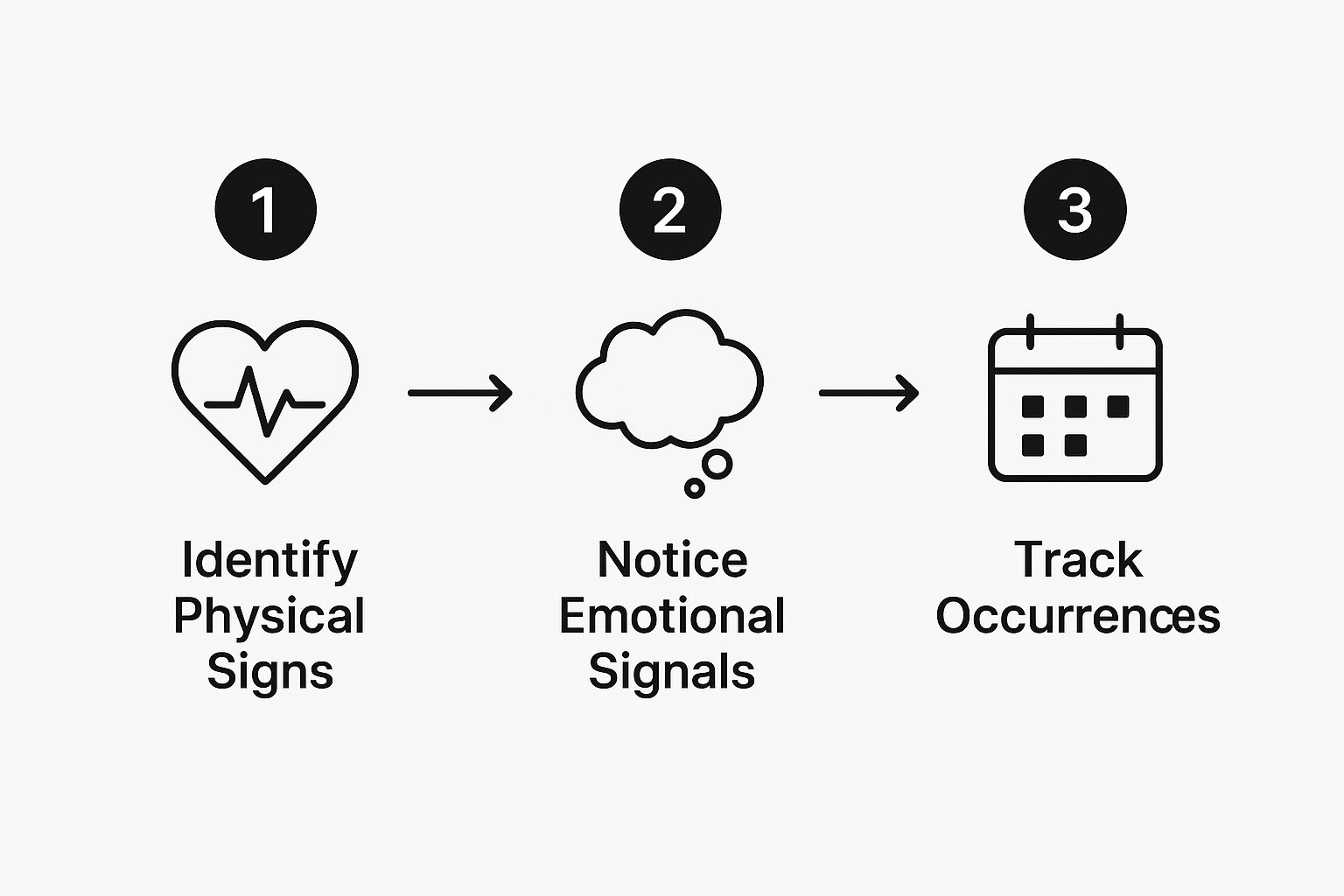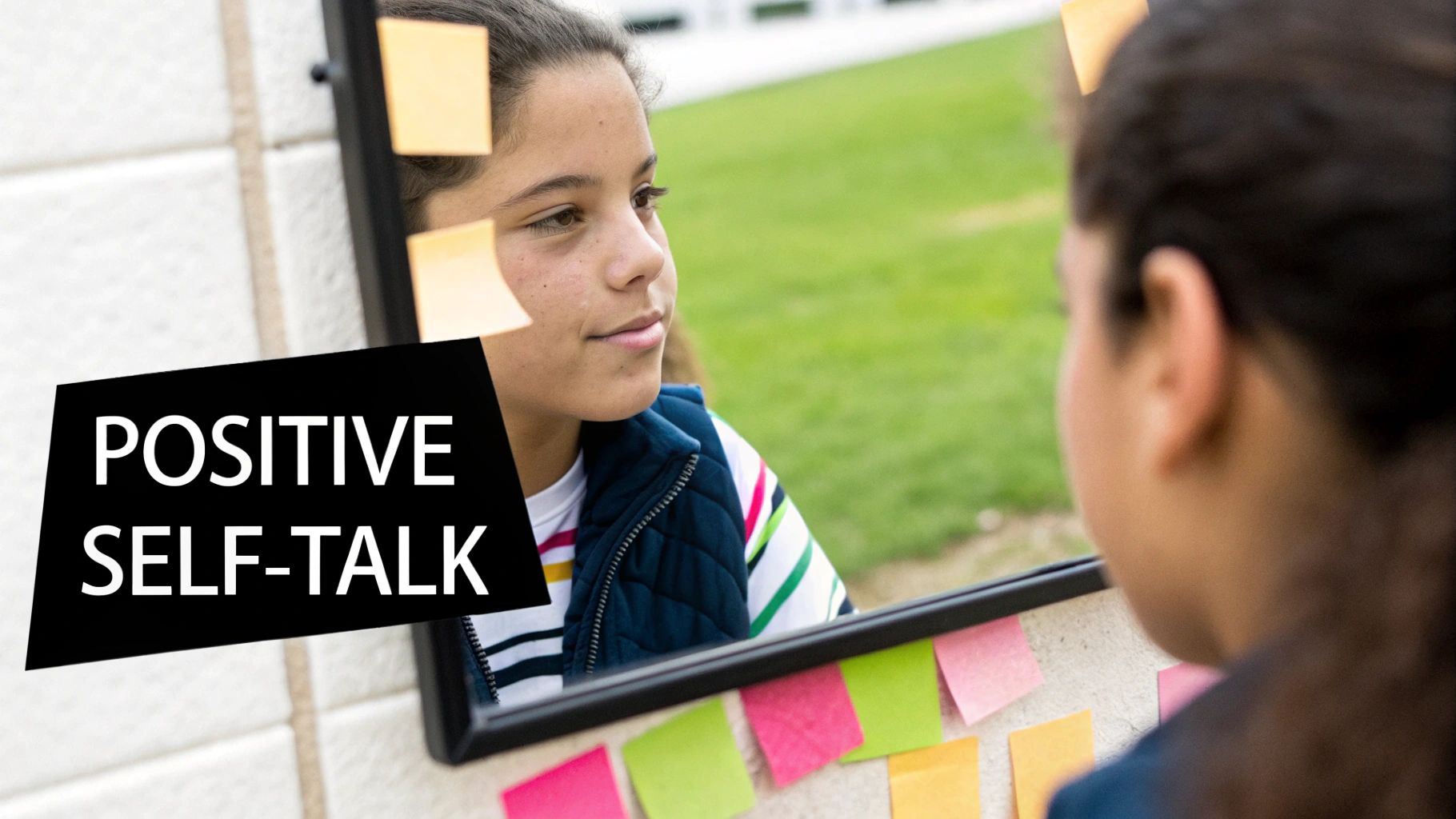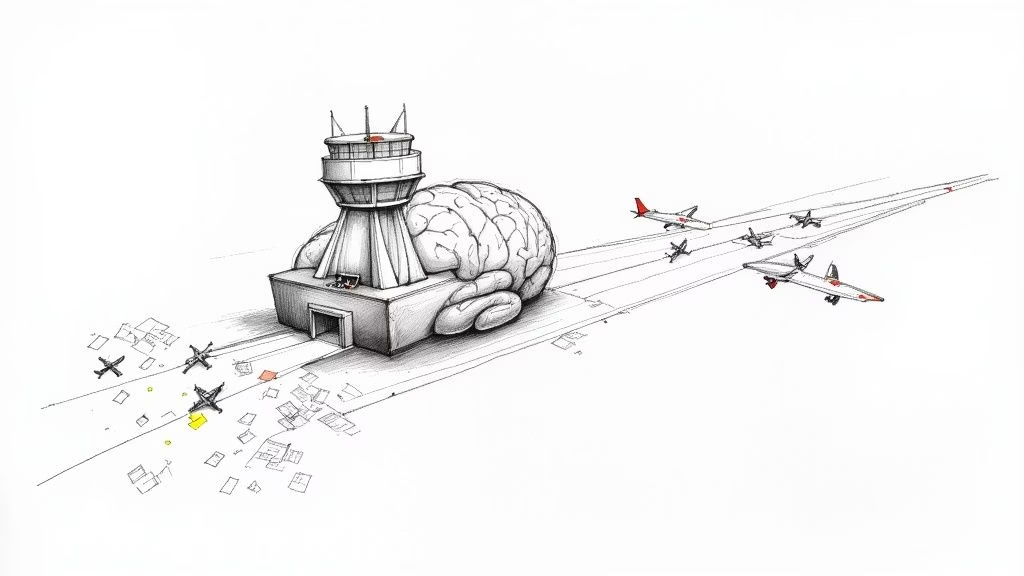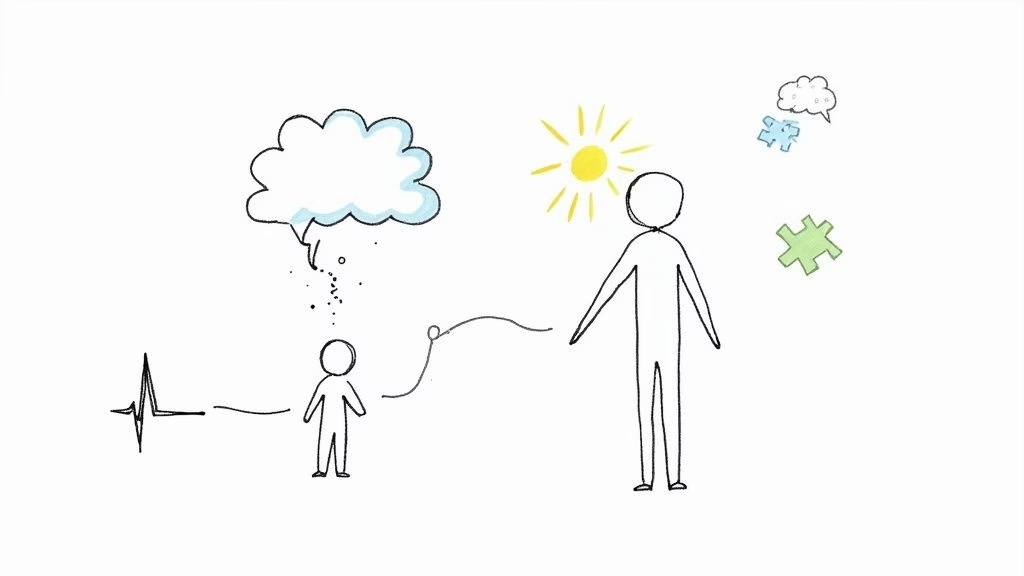If you want to get a handle on test anxiety, it’s not just about studying harder. It’s about a smarter approach—one that combines solid preparation with a calmer mindset and a few good techniques for staying grounded when the pressure hits. The real strategy is about recognizing what’s happening in your mind and body, building a study routine that actually builds confidence, and having some go-to exercises to keep you centered.
What Is Test Anxiety and How Does It Feel?
We’ve all felt a few butterflies before a big exam. But test anxiety is a whole different beast. It’s a specific kind of performance anxiety where the fear of failing gets so intense that it can completely derail you, even when you know the material inside and out. It’s that awful, sinking feeling when you stare at a question you know you studied for, but your mind is just… blank.
If this sounds familiar, you’re not alone. This is an incredibly common experience, and it’s definitely not a sign of weakness. In fact, research shows just how widespread this is. A 2020 study found that 54.7% of first-year undergraduate health science students felt it, and similar numbers pop up all over the world. In some places, the rate is as high as 89.4%. That’s a massive number of students feeling the exact same way. You can dig into the numbers yourself in the full study on test anxiety prevalence.
Before we dive into how to manage it, it helps to know what you're looking for. Test anxiety shows up in our thoughts, our bodies, and our feelings all at once.
Symptoms of Test Anxiety At a Glance
Here’s a quick rundown of the common signs. Seeing them laid out like this can be the first step in recognizing what's happening and taking back control.
| Cognitive Symptoms (Thoughts) | Physical Symptoms (Body) | Emotional Symptoms (Feelings) |
|---|---|---|
| Mind going blank | Racing heart | Dread or fear |
| Negative self-talk | Sweaty palms | Irritability or anger |
| Difficulty concentrating | Nausea or upset stomach | Feeling helpless |
| Comparing yourself to others | Headaches or muscle tension | Low self-esteem |
| Racing thoughts | Shortness of breath | Frustration |
| "Catastrophizing" (imagining the worst) | Dizziness or feeling faint | Panic or overwhelm |
Recognizing these symptoms as they happen is huge. It lets you step back and say, "Okay, this is just the anxiety. It's not me." That little bit of distance gives you the power to use the strategies we'll talk about next.
The Link Between Anxiety, Procrastination, and Motivation
To really tackle test anxiety, you have to see how it’s tangled up with other parts of student life—especially procrastination and motivation. When the thought of an exam becomes completely overwhelming, it’s only natural to want to avoid the thing causing all that stress.
That avoidance almost always looks like procrastination. Suddenly, cleaning your entire room seems way more important than opening a textbook. You find yourself endlessly scrolling social media or starting a new series—anything but studying. This isn't about being lazy; it's a coping mechanism your brain is using to protect you from feeling that intense fear.
But this creates a nasty feedback loop:
- Anxiety sparks procrastination: The fear makes studying feel like an impossible mountain to climb, so you put it off.
- Procrastination means less prep: Pushing your study sessions to the last minute means you’re not as prepared as you could be.
- Lack of prep fuels more anxiety: As the test looms, the reality of being unprepared hits, and your anxiety skyrockets.
It’s a vicious cycle that just crushes your motivation and can easily become a self-fulfilling prophecy. You end up performing poorly not because you couldn’t learn the material, but because anxiety stood in the way of you ever getting to it.
Parenting Tip: Instead of getting stuck on the procrastination itself, try to get to the root of the anxiety. Open up a conversation with something like, "I've noticed you're having a tough time getting started. Exams can be really stressful. How are you feeling about this one?" This small shift can change the dynamic from blame to support.
Simply recognizing this pattern is the first real step toward breaking free. The goal isn't just to force yourself to study more. It's about managing the anxiety so you can study effectively and walk into that exam ready to show what you actually know.
Build a Study Routine That Prevents Panic
Feeling unprepared is a direct line to test anxiety. I see it all the time—when you know deep down you haven't put in the work, your brain naturally defaults to panic mode. That familiar cycle of putting things off, followed by a frantic, all-night cramming session, is a guaranteed recipe for stress. It's often rooted in the fear of failure itself.
The single most powerful tool you have to break this cycle is a smart, consistent study routine.
This isn’t about locking yourself in a room for eight hours straight. It’s about studying smarter, not harder. Effective preparation systematically dismantles anxiety because it builds genuine, earned confidence. When you have a system, that feeling of dread gets replaced by a sense of control. You walk into the exam knowing you’ve done the work, which is the best way to quiet that negative voice in your head.
Taming Procrastination with a Plan
Let's get one thing straight: procrastination is rarely about being lazy. It's an emotional response to a task that feels overwhelming. A huge final exam can feel like an impossible mountain to climb, so what do we do? We avoid it.
The secret is to break that mountain down into small, manageable hills.
- Break It Down: Stop putting "Study for History" on your to-do list. That’s way too big. Instead, get specific: "Review Chapter 3 vocabulary" or "Outline one essay question."
- Time-Block Your Schedule: Pull out a calendar and block out short, dedicated study periods. I’m talking 25-30 minutes of focused work. That’s far more effective than hours of distracted, half-hearted studying.
- Start with the Easiest Task: Give yourself a small win. Knocking out something simple first builds momentum and gives you the motivation to tackle the tougher stuff.
This simple diagram visualizes how to start recognizing the physical and emotional cues of stress—the very things that often trigger procrastination in the first place.

Learning to track these signals helps you see when anxiety is starting to creep in. That gives you a chance to use a coping strategy before it snowballs into full-blown avoidance.
Proven Study Techniques to Boost Retention
Once you get yourself to start, you need to make sure your time is actually paying off. There are a ton of methods out there, but two of the most effective are the Pomodoro Technique and spaced repetition. They work because they align with how our brains actually learn.
The Pomodoro Technique is incredibly simple. You study with intense focus for 25 minutes, then take a 5-minute break. After four of these "Pomodoros," you take a longer break of 15-30 minutes. This approach fights burnout and makes it so much easier to get started—after all, anyone can commit to just 25 minutes.
Spaced repetition is all about reviewing information at increasing intervals. Instead of cramming a concept 20 times in one night, you review it after a day, then a few days later, then a week later. This process is crucial for moving information from your short-term to your long-term memory, which is what allows for real learning and recall under pressure.
Parenting Tip: Help your teen create a visible study schedule. Having a physical calendar or whiteboard can make the plan feel more concrete and less overwhelming. Frame it as a partnership in tackling a big project, offering support rather than pressure. For more ideas, explore our complete guide on stress management for teens.
Rewire Your Mindset for Exam Day Confidence
A solid study routine is your foundation, but the real battle against test anxiety is often won or lost in your mind. I’ve seen it happen time and again. The moments right before and during an exam are when that negative inner voice gets loudest, whispering doubts that can sabotage weeks of hard work.
Learning to manage your mindset isn't just a nice idea; it's a practical skill that gives you direct control over your body's stress response.

This isn't about pretending the pressure doesn't exist. It's about acknowledging it without letting it take the driver's seat. These mental strategies are tools you can use right at your desk to stay centered, focused, and confident when it really counts.
Challenge Your Negative Thoughts
That internal monologue that says, "I'm going to fail," or "Everyone else knows more than me," is a massive source of anxiety. The trick is to catch these thoughts in the act and challenge them with a dose of reality. Don't just let them run wild.
When you catch yourself spiraling into the worst-case scenario, just pause and ask: "Is this thought 100% true?" Almost always, the answer is a clear no. You've studied, you've prepared, and you definitely know some of the material.
Next, replace that catastrophic thought with a more balanced one. Instead of "I'm going to fail," try something like, "This is challenging, but I've prepared for it, and I'm going to do my best." This small shift is powerful enough to stop the anxiety spiral in its tracks.
Parenting Tip: Help your teen get their anxious thoughts out of their head. Encourage them to write down their biggest fears about the test. Seeing them on paper makes them feel less powerful and more manageable, opening the door to challenge and reframe them together.
Use Mindfulness to Stay Grounded
When your heart starts racing and your mind goes blank, your body has flipped its panic switch. Simple mindfulness and breathing exercises are your emergency off-button. Research shows that a mix of psychological and behavioral tactics are effective for overcoming test anxiety, and techniques like deep breathing directly address the body's physical panic response.
Here's a simple technique you can do anywhere, anytime:
- Box Breathing: Silently inhale through your nose for a count of four.
- Hold your breath for a count of four.
- Exhale slowly through your mouth for a count of four.
- Hold at the bottom for another count of four.
Repeat this cycle three to five times. This exercise forces your breathing to regulate, which sends a direct signal to your brain that you're safe and in control. Effective interventions often combine cognitive-behavioral strategies with relaxation techniques just like this one to build coping skills. You can read the full research about these test anxiety findings to see the science behind it.
Visualize Your Success
Here's something cool about your brain: it often has trouble telling the difference between a vividly imagined experience and a real one. You can use this to your advantage.
Before the exam, take a few minutes each day to mentally rehearse what success looks and feels like.
Close your eyes. Picture yourself walking into the exam room feeling calm and prepared. Imagine sitting down, reading the instructions clearly, and confidently tackling questions you know. See yourself easily recalling information and finishing the test with time to spare. This mental practice builds a blueprint for success in your mind, which helps quiet the fear of the unknown when the real day comes.
How Anxiety Impacts Your Motivation and Performance
Ever had that frustrating experience where you know the material inside and out, ace all the practice quizzes, but then freeze up on test day? It feels like all that knowledge just vanishes. This isn’t a fluke or a sign you didn't study enough—it's a direct result of how anxiety messes with your brain's ability to perform under pressure.

When you’re facing a high-stakes situation like a final exam, your brain can flip into "fight-or-flight" mode. This floods your body with stress hormones like cortisol and adrenaline. While great for outrunning a bear, they’re terrible for complex thinking.
These hormones basically hijack the prefrontal cortex—the part of your brain in charge of memory, focus, and logical reasoning. That’s why your mind goes blank. The information is still in there, but anxiety is literally blocking the pathways to get to it.
This isn't just a theory; it's well-documented. A 2012 study on university entrance exams found that around 48% of students struggled with test anxiety, which negatively impacted their scores by disrupting these exact cognitive functions. You can read the full research on test anxiety and academic outcomes to see the data for yourself.
The Vicious Cycle of Anxiety and Procrastination
This fear of failure doesn’t just pop up on the day of the test. It often starts a self-sabotaging cycle weeks earlier, completely killing your motivation to even crack open a book.
When an exam feels overwhelming, the natural response is to avoid it. This is where procrastination kicks in. Suddenly, organizing your closet or binge-watching a new series feels way more important than studying. This isn't laziness—it's your brain's attempt to cope with the stress.
The problem is, this creates a nasty feedback loop:
- Fear leads to avoidance. The anxiety makes studying feel like an impossible mountain to climb, so you put it off.
- Avoidance leads to being unprepared. Cramming at the last minute just isn't as effective as consistent review, so you end up genuinely underprepared.
- Being unprepared leads to more fear. As the test gets closer, the fact that you haven't studied enough just amplifies your original anxiety, making your fear of failure feel totally justified.
This cycle can make it feel impossible to start. But just recognizing this pattern is the first step to breaking it. It helps you shift your thinking from "I'm just a procrastinator" to "I need some tools to manage this anxiety." For more strategies, our guide on how to reduce anxiety offers practical advice you can use right away.
Parenting Tip: Try to create an environment where you praise effort over the final grade. Instead of asking, "Are you ready for your test?" shift the focus. Try saying, "I can see you're putting in a lot of work to prepare for this, and that’s what matters." This takes the pressure off a specific outcome and reinforces the value of the process, which can go a long way in lowering performance-related stress.
How Parents Can Support a Teen with Test Anxiety
Watching your teen grapple with test anxiety is tough. You want to help, but sometimes it feels like anything you say just adds more pressure. I've seen this dynamic play out countless times. The key is to shift your role from being an academic watchdog to a supportive ally. You want to create a home where it’s safe to struggle and okay to fail.
This starts with changing the way you talk about school. Instead of leading with, "Did you study?" or "What grade did you get?" try focusing on the effort and the process.
A simple question like, "How's the prep for your history test going?" can open the door to a real conversation. It’s an invitation to talk about how they feel, not just how they’re performing.
Foster an Environment of Open Communication
Anxiety loves silence. Your teen might be worried that admitting their fears will just lead to a lecture or expressions of disappointment. It's so important to create a space where they can talk about that stress without bracing for criticism.
Just validating their feelings can lift a huge weight. Try saying something like, "It makes total sense that you're feeling stressed; this is a big exam." This small act of acknowledgment shows them you're on their side. You're there to listen and figure it out together.
When a teen feels understood, they are far more likely to accept guidance. The first step isn't about fixing the problem—it's about making sure they don't feel like they're facing it alone.
For a deeper dive into these conversations, our guide on how to help a teenager with anxiety offers more practical advice.
Model Healthy Coping and Practical Support
Teens learn how to handle stress by watching the adults around them. When you’re dealing with a tough situation at work, talk about it. Let them see you use healthy coping skills—maybe it’s going for a walk, taking a few deep breaths, or just admitting, "I'm feeling really overwhelmed, but here's my plan to tackle it."
Beyond modeling, you can offer practical, foundational support that has a direct impact on their ability to manage academic pressure.
This includes:
- Prioritizing Sleep: A sleep-deprived brain is an anxious brain, period. Help them lock in a consistent sleep schedule, especially in the week leading up to a big test. No all-nighters.
- Encouraging Good Nutrition: Make sure they have access to healthy meals and snacks. Real food stabilizes mood and energy levels, which are critical for focus and keeping emotions in check.
- Helping with Structure: Anxiety often leads to procrastination, which just makes the anxiety worse. Sit with them and help break down study material into smaller, less intimidating chunks. A huge project feels manageable when it's just a series of small steps.
By focusing on these pillars of well-being, you’re not just helping with one test. You’re building a resilient foundation that will help your teen manage the inevitable pressures of school, and honestly, life. Your support in these areas is one of the most powerful tools they have.
Mental Health Resources for Teens and Families
While the strategies we've talked about are powerful tools, sometimes the weight of test anxiety, procrastination, and academic pressure is just too much to carry alone. And that's completely okay. Recognizing when you need to bring in some backup is a sign of strength, not a sign of weakness.

But knowing where to even start can feel overwhelming. Think of this as your starting point. Your school counselor is often the best first person to talk to. They're trained to support students and can point you toward the right resources, whether that's within the school or out in the community.
For more focused help, a clinical psychologist or therapist can offer proven approaches like Cognitive Behavioral Therapy (CBT). This isn't just about talking; it's a practical way to directly challenge and reframe the negative thought patterns that fuel anxiety in the first place.
Finding Support Online and On Your Phone
Sometimes, the easiest first step is a digital one. Thankfully, there are some incredible organizations out there offering confidential help, information, and tools specifically designed for teens. They get it.
Here are a few trusted places to turn:
- The Jed Foundation: This is a fantastic resource hub for teens covering all things mental health, from managing anxiety to navigating the big transition after high school.
- Anxiety & Depression Association of America (ADAA): ADAA is packed with solid information and research. They also have a super useful "Find a Therapist" tool to help you locate professionals who specialize in anxiety.
- Crisis Text Line: If you need support right now, this is a free, 24/7 service. Just text HOME to 741741, and you'll be connected with a trained crisis counselor who can help you through a tough moment.
For parents, your role is to open the door to these resources without pushing your teen through it. Frame it as a team effort: "Let's look at some options together and see what feels like the best fit for you."
This simple shift in approach takes the pressure off. It empowers your teen to take an active role in their own well-being, turning a moment of struggle into an opportunity to build resilience and confidence.
Still Have Questions? Let’s Clear Things Up.
Even with the best strategies, it's natural to have a few lingering questions. Let's tackle some of the most common ones that come up for students and parents.
What’s the Real Difference Between Nerves and Anxiety?
It's a great question, and the line can feel blurry. A little bit of pre-test jitters is totally normal—in fact, that small jolt of adrenaline can actually sharpen your focus. I've felt it myself before big presentations or climbs. It's your body's way of saying, "Okay, this is important. Let's go."
But true test anxiety is a different beast entirely. It’s more intense, often bringing on overwhelming dread and even physical symptoms like a racing heart, sweaty palms, or a sick feeling in your stomach.
The key difference is interference. If those feelings are so powerful they stop you from studying, or worse, make you blank out on answers you absolutely know during the exam, you've crossed over from nerves into anxiety.
Can You Ever Get Rid of Test Anxiety for Good?
While you might not "cure" it like a common cold, you can absolutely learn to manage it so effectively that it no longer holds you back. The goal isn't to eliminate every ounce of stress from your life—that's impossible. The goal is to build the skills to keep it from taking over.
With consistent effort—dialing in your study habits, practicing mindfulness, and actively challenging those negative thoughts—you can shrink its power dramatically. It shifts from being this huge, overwhelming force to a manageable feeling you can navigate.
For many students I've worked with, the real "aha!" moment is realizing that procrastination isn't a character flaw—it's an emotional response to feeling overwhelmed. That’s why tackling the anxiety itself is the key to unlocking motivation.
When Should We Bring in a Professional?
If the anxiety is severe and the strategies you've tried aren't making a dent, it’s time to get some extra support. Don't wait.
Look for signs like full-blown panic attacks, a persistent refusal to go to school, or significant changes in sleep, eating habits, or grades. These are red flags that something deeper is going on.
A school counselor is an excellent first stop. They know the landscape and can provide immediate guidance. From there, they can often refer you to a therapist who specializes in working with teens on anxiety, making sure they get the targeted support they truly need.
If your teen is stuck in that frustrating cycle of procrastination, anxiety, and wavering motivation, personalized coaching can be the key to breaking free. At Andrew Petrillo Life Coaching, I give teens the specific tools and strategies they need to build real confidence and take back control of their academic life.
You can learn more about my approach right here: https://andrewpetrillolifecoaching.com.



















